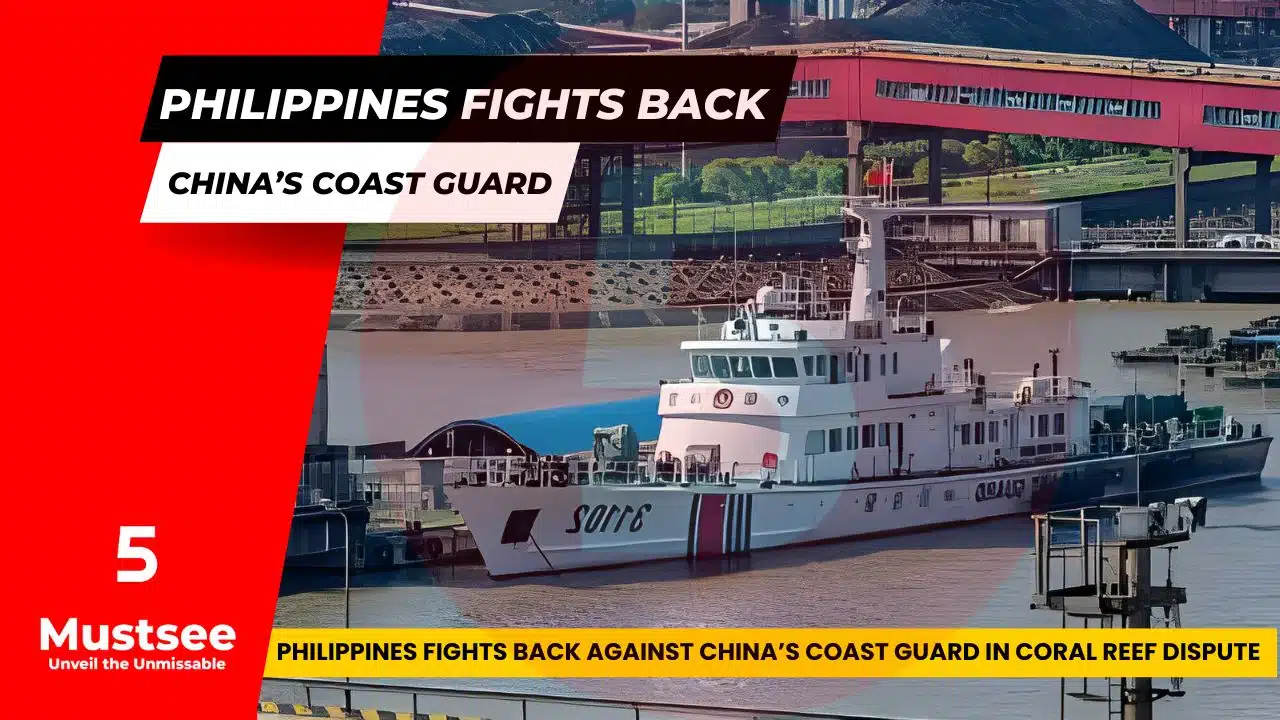The South China Sea is highly contested, with multiple nations claiming sovereignty over its islands, reefs, and waters. The dispute has implications for regional and global security, as the South China Sea is a vital trade route, a rich source of natural resources, and a strategic location for military operations. China, the Philippines, the US, and other claimants like Vietnam, Malaysia, Brunei, and Taiwan constitute the critical players in the dispute.
This article will focus on how the Philippines is resisting China’s aggressive actions in the South China Sea, especially in the coral reef areas, using diplomatic, legal, and military means. The article will also discuss how the US supports the Philippines in the coral reef dispute and the challenges and opportunities for resolving or managing the conflict peacefully and sustainably.

China’s Maritime Militia and Its Impact on Coral Reefs
China’s maritime militia, under military guidance, operates in the South China Sea, serving as a paramilitary force for the government. The naval militia consists of civilian fishing boats equipped with weapons, communication devices, and surveillance equipment. China deploys maritime militia to assert territorial claims, harass other claimants, and conduct intelligence and reconnaissance missions.
China’s maritime militia targets coral reef areas in the South China Sea, including Whitsun Reef and Second Thomas Shoal. China, the Philippines, and other countries claim these areas. China’s maritime militia has played a role in several incidents in these areas, such as blocking access to Philippine fishermen, occupying reefs and sandbars, building artificial structures, and clashing with Philippine coast guard vessels.
China’s maritime militia activities hurt the South China Sea’s coral reefs and marine environment. According to experts, China’s naval militia damages the coral reefs by anchoring on them, dredging them for sand and gravel, dumping waste and debris, and destroying marine life. These actions threaten the biodiversity and ecosystem of the South China Sea, as well as the livelihoods and food security of local communities that depend on fishing and tourism.
Philippines’ Response to China’s Coast Guard
The Philippines has been one of the most vocal and active opponents of China’s actions in the South China Sea. The Philippines has challenged China’s claims and activities in international courts, diplomatic forums, and media outlets. It has also strengthened its military capabilities and cooperation with allies such as the US, Japan, Australia, and India.
In March 2023, the Philippines responded to China’s coast guard, exemplified by the incident at Whitsun Reef. Whitsun Reef is a coral reef located in the Spratly Islands group in the South China Sea. Both China and the Philippines, as well as Vietnam, claim the reef. In March 2023, a Philippine Air Force patrol spotted more than 200 Chinese fishing boats near Whitsun Reef. The Philippines accused China of using fishing boats as a maritime militia to occupy and militarize Whitsun Reef.
The Philippine Coast Guard responded by sending its vessels to monitor and challenge the Chinese boats at Whitsun Reef. The Philippine Coast Guard held exercises with the US near Whitsun Reef to demonstrate their presence and readiness. The Coast Guard of the Philippines also issued radio warnings to the Chinese boats to leave Whitsun Reef or face legal action.
The Philippine Coast Guard faces several challenges and opportunities in dealing with China’s coast guard in the coral reef areas. Some of the challenges include:
- The numerical and technological superiority of China’s Coast Guard over the Philippine Coast Guard
- The risk of escalation and confrontation between the two sides
- The lack of clarity and consensus on the rules of engagement and communication protocols
- The pressure from domestic public opinion and political factions
Some of the opportunities include:
- The support from international law and opinion in favor of the Philippines’ rights and interests
- The cooperation with regional and global partners such as ASEAN, US, Japan, Australia, India
- The leverage from economic and trade relations with China
- The potential for dialogue and confidence-building measures with China
US Support for the Philippines in the Coral Reef Dispute
The US is a crucial ally and partner of the Philippines in the South China Sea dispute. The United States has a mutual defense treaty with the Philippines that obliges both parties to assist each other in case of an armed attack on their territory or armed forces. The US also provides military assistance, training, equipment, and intelligence to the Philippine armed forces.
The US has supported the Philippines in the coral reef dispute with China. In April 2023, US Secretary of State Antony Blinken issued a statement condemning China’s coast guard actions at Whitsun Reef and reaffirming the US commitment to defend the Philippines under the mutual defense treaty. Blinken also called on China to abide by the 2016 Permanent Court of Arbitration ruling invalidating China’s South China Sea claims and recognizing the Philippines’ rights and entitlements.
The US and the Philippines conducted joint military exercises in the South China Sea, including Balikatan and Cooperation Afloat Readiness. These exercises enhance interoperability, readiness, and deterrence against potential threats. The US and the Philippines jointly raised awareness and pressured China’s actions in the South China Sea through diplomatic efforts.
Challenges exist in US-Philippines cooperation in the South China Sea, particularly in coral reef areas. Some of these are:
- The uncertainty and inconsistency of US policy and strategy on the South China Sea under different administrations
- The reluctance and resistance of some Philippine leaders and sectors to align with US interests and values
- The sensitivity and complexity of dealing with China as a significant power and a rival
- The need to balance security and economic interests and avoid provoking or alienating China
Conclusion
The Philippines-China coral reef dispute in the South China Sea is a critical, urgent issue impacting regional and global security. The Philippines is resisting China’s aggressive actions in the coral reef areas using diplomatic, legal, and military means. The US supports the Philippines in the coral reef dispute by providing security guarantees, military assistance, and diplomatic pressure. However, both sides have challenges and opportunities to resolve or manage the conflict peacefully and sustainably.
FAQs.
Q: What is Whitsun Reef?
A: Whitsun Reef is a coral reef located in the Spratly Islands group in the South China Sea. China, the Philippines, and Vietnam claim it.
Q: What is China’s maritime militia?
A: China’s maritime militia is a paramilitary force that operates in the South China Sea under the guidance and coordination of the Chinese military and government. It comprises civilian fishing boats with weapons, communication devices, and surveillance equipment.
Q: What is the US-Philippines mutual defense treaty?
A: The US-Philippines mutual defense treaty is a bilateral agreement that obliges both parties to assist each other in case of an armed attack on their territory or armed forces. US-Philippines signed in 1951 and continues to be in power today.
Q: What is the Permanent Court of Arbitration ruling on the South China Sea dispute?
A: In 2016, an international tribunal, the Permanent Court of Arbitration, issued a legal decision that nullified China’s assertions in the South China Sea dispute, acknowledging the rights and entitlements of the Philippines.





